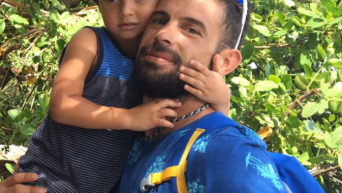David Mendoza knows how much health coverage matters. It was a hard-won lesson that nearly cost him his life. But it could have also cost his family’s financial security.

Mendoza owns a small tree-trimming business in Miami, Florida. In 2016, while removing tree limbs from the roof of a garage, the chainsaw he was holding slipped and landed on his left arm, severing tendons and major blood vessels. He was rushed to the emergency room where the wound was cleaned and closed.
The accident came just two weeks after he had signed up for a health insurance plan through the federal Health Marketplace. For many years didn’t think he could afford health insurance. But with the Affordable Care Act, he was able to find a plan where he paid $50 a month in premiums, with financial assistance.
“I had never had an accident like this in my life,” Mendoza said. “So I had never really thought about having health insurance.” As a healthy 35-year-old, Mendoza had never previously experienced any serious illness, either.

The emergency treatment was followed by a visit to hand specialist (to make sure he regained movement in his hand), surgery to repair torn tendons and relieve a pinched nerve and six weeks of physical therapy.
Without health insurance to cover the costs of treating his injury, Mendoza said he might owe $100,000 in medical bills, or have gone without the necessary surgery and rehab that let him go back to work to support his family.
“If I don’t have insurance and I get injured again, the medical bills I would incur would destroy me financially for the rest of my life. If I can’t afford health insurance in the future, I would have to close my business.”
Health care costs are a major burden for low- and middle-income wage earners like Mendoza. Before the Affordable Care Act, going without healthcare was often the only option. A 2014 survey from the Kaiser Family Foundation showed that affordable health care relieves these families of problem with medical bills while also allowing better access to the medical services they need:
“A primary goal of expanding health insurance coverage is to help people access the medical services that they need. The survey findings reinforce other findings that insurance facilitates access to health care, indicating that adults who gained coverage in 2014 are more likely to be linked to regular care, less likely to postpone care when they need it, and more likely to use preventive services than those who remained uninsured.”
More than half (53 percent) of low-income families and more than one in four (42%) of middle-income families that gained coverage in 2014 received financial assistance to afford their healthcare policies. Without financial assistance to purchase health insurance, these families would struggle to pay medical bills:

Source: http://www.kff.org/report-section/how-does-gaining-coverage-affect-peoples-lives-issue-brief/
